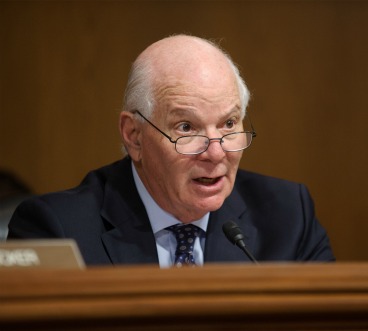Terrorism

Hamas’ Hostages, Putin’s Prisoners, and Freeing Inte...
Oct 25, 2023The practice of seizing hostages and political prisoners, as well as actively terrorizing civilians is a constant displayed by Hamas in Israel and Russia’s war against Ukraine. To highlight issues […]

Israel and Ukraine Against Terror
Oct 19, 2023Terrorist attacks against innocent Israeli and Ukrainian civilians have shocked the world with their cruelty and sophistication. These unprovoked attacks are fueled by transnational terrorist networks that include Hamas, Russia, […]
Helsinki Commissioners Announce Re-Introduction of H...
Jan 25, 2023Today, Helsinki Commissioners Steve Cohen, Joe Wilson, Marc Veasey, Richard Hudson, Ruben Gallego and Brian Fitzpatrick along with Representatives Ted Lieu, Maria Salazar and Marcy Kaptur, re-introduced the Holding Accountable […]
Following in the Footsteps of Tsar Nicholas II
Apr 27, 2022As Vladimir Putin attempts to turn back the clock to the Russian Empire of the pre-Soviet era, he also adopts a tool of political manipulation used in Imperial Russia—fostering violent […]

HELSINKI COMMISSIONERS JOIN OSCE PA MEETING ON AFGHA...
Nov 09, 2021On November 4, 2021, more than 40 members of the OSCE Parliamentary Assembly (PA) met remotely to discuss the current security challenges posed by developments in Afghanistan and the future […]

Helsinki Commission Commemorates 45 Years of Advanci...
Jun 03, 2021WASHINGTON—To commemorate the 45th anniversary of the Commission on Security and Cooperation in Europe, also known as the U.S. Helsinki Commission, on June 3, Chairman Sen. Ben Cardin (MD) and […]
OSCE Ministerial Council Appoints Top Leaders, Adopt...
Dec 21, 2020By Shannon Simrell, Representative of the Helsinki Commission to the U.S. Mission to the OSCE Foreign ministers of the 57 OSCE participating States convened on December 3 – 4, 2020, […]

Remarks from Sen. Cardin Concerning Election Observa...
Nov 12, 2020Statement at the OSCE Parliamentary Assembly Meeting of the Standing Committee Mr. Secretary General on behalf of the U.S. Helsinki Commission, let me congratulate our president, our secretary general, and leadership […]

Hastings: Petty Parochialism Denies OSCE Vital Leade...
Jul 14, 2020WASHINGTON—Following yesterday’s failure of OSCE representatives to renew the mandates of four leadership positions—the OSCE Secretary General, the High Commissioner on National Minorities, the Representative on Freedom of the Media, […]
Congressional Delegation Led by Chairman Hastings Ch...
Feb 25, 2020WASHINGTON—Helsinki Commission Chairman Rep. Alcee L. Hastings (FL-20) last week led a bicameral, bipartisan congressional delegation to the OSCE Parliamentary Assembly’s (OSCE PA) 19th Winter Meeting in Vienna, Austria. At […]
Public Diplomacy, Democracy, and Global Leadership
Dec 05, 2019For more than a century, the United States has advanced shared human rights, economic, and security policy goals in the transatlantic relationship by cultivating people-to-people ties through public diplomacy initiatives. […]
Helsinki Commission to Review Role of Professional E...
Dec 02, 2019WASHINGTON—The Commission on Security and Cooperation in Europe, also known as the Helsinki Commission, today announced the following hearing: PUBLIC DIPLOMACY, DEMOCRACY, AND GLOBAL LEADERSHIP An Approach for the 21st […]
